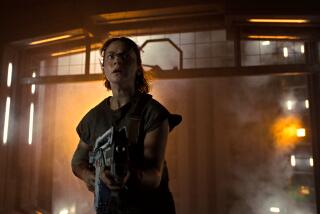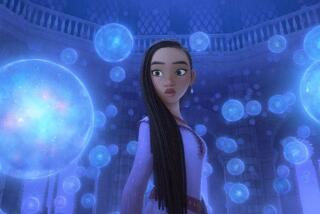‘Mulan’: Formula With a New Flavor
Memo to the gang at Walt Disney animation: Your formula is showing.
It’s a fine formula, and as displayed in Disney’s “Mulan,” the latest in the self-replenishing stream of animated features from the studio, it produces a number of sure-fire sentimental moments. But formula can be pushed too hard, serving as a crutch as well as a comfort. “Mulan” has its accomplishments, but unlike the best of Disney’s output, it comes off as more manufactured than magical.
Disney has literally scoured the globe for different cultures to animate--only the wonderfully named Norse epic “The Prose Edda of Snorri Sturluson” has unaccountably been ignored. “Mulan,” based on a popular Chinese legend, is set more than 2,000 years ago in a China that has built the Great Wall as security against Hun incursions.
No wall, however impressive, can keep out the fierce Shan-Yu (voiced by Miguel Ferrer), the Hun leader with gimlet eyes and a body like the Incredible Hulk. Reacting to the invasion, the kindly emperor (Pat Morita) thinks first of protecting his people. But he does send the officious Chi Fu (James Hong) to round up new recruits. “A single grain of rice can tip the scale. One man may be the difference between victory and defeat,” the ruler says, which is why he’s emperor and we’re not.
Meanwhile, somewhere in the heart of China, a young woman named Mulan (Ming Na-Wen) is having her own kind of problems. The despair of her traditional parents, Mulan is a brainy tomboy who’s unafraid of speaking her mind yet worries about not being appreciated. “When,” she asks, “will my reflection show who I am inside?”
Mulan’s real difficulty, of course, is that she is a completely modern young woman, a Valley girl who’s been trapped with typical Disney shrewdness in a patriarchal civilization where marrying well is the only way for a woman to bring honor to her family.
It’s at this point that the war comes to Mulan’s village. The emperor has decreed that one man from each family will be drafted, and, anxious to prevent the sure death of her infirm father, Mulan cuts off her hair (a homage to “G.I. Jane”?) and joins up in his place.
The loutish men who are Mulan’s comrades-in-arms are not so sure about this slender new youth at first. But under the command of a handsome young captain named Shang (B.D. Wong), Mulan becomes enough of a warrior to prove, to the surprise of no one in the audience, that the best man for even a military job can be a woman.
The simplicity of this story line (dressed up with impressive computer-animated Hun hordes) is not without its appeal. As a vivacious rebel who has to be true to herself no matter what, Mulan is an excellent heroine, perfect for the young female demographic the studio is most anxious to attract. And this resourceful, can-do young woman is a more likable and resourceful role model than Pocahontas was.
While an independent, not completely boy-crazy heroine is somewhat new for Disney, what finally undoes “Mulan,” directed by Barry Cook and Tony Bancroft, are those standard elements that have not been re-energized. The by-now-standard hip patter (prepare for jokes about cross-dressing) is so tepid that not even five credited writers can revive it, and the songs by Matthew Wilder and David Zippel (with Lea Salonga and Donny Osmond singing for the leads) lack the spark that Zippel’s lyrics brought to the underappreciated “Hercules.”
On a visual level, there’s too much familiar shtick as well, including excessive use of the oldest of animation cliches, like people’s backsides catching on fire. Similarly, the sidekicks Mulan hangs out with in the army are always hitting the wrong person and falling to the ground in displays that are more familiar than funny.
Perhaps as a safety measure, Mulan is also given two cute, nonhuman sidekicks. One, a cricket named Cri-Kee, is not around much, but the other, a midget dragon guardian named Mushu, is voiced by Eddie Murphy and positioned as precisely the same kind of crowd-pleaser Robin Williams was in “Aladdin” and James Woods in “Hercules.”
It’s that reliance on schematic, fill-in-the-blanks dramatic structures that is “Mulan’s” problem. Of course Murphy is amusing as a demoted family guardian who wants a chance to make good, but neither his patter nor his role is inspired.
Though “Beauty and the Beast,” perhaps the best of the modern Disney animated features, was nominated for best picture, that’s not going to happen here. For all the warmth and positive feelings its title character generates, “Mulan” is finally too much of a cartoon for its own good.
* MPAA rating: G. Times guidelines: menacing Hun invaders.
‘Mulan’
Ming-Na Wen, Lea Salonga: Mulan
Eddie Murphy: Mushu
B.D. Wong, Donny Osmond: Shang
Harvey Fierstein: Yao
Jerry Tondo: Chien-Po
Gedde Watanabe: Ling
James Hong: Chi Fu
Miguel Ferrer: Shan-Yu
Soon-Tek Oh: Fa Zhou
Freda Foh Shen: Fa Li
Pat Morita: The Emperor
June Foray, Marni Nixon: Grandmother Fa
George Takei: First Ancestor
Released by Walt Disney Pictures. Directors Barry Cook, Tony Bancroft. Producer Pam Coats. Screenplay Rita Hsiao, Christopher Sanders, Philip LaZebnik, Raymond Singer & Eugenia Bostwick-Singer. Based on a story by Robert D. San Souci. Editor Michael Kelly. Music Matthew Wilder. Lyrics David Zippel. Score Jerry Goldsmith. Production design Hans Bacher. Art director Ric Sluiter. Running time: 1 hour, 27 minutes.
* In general release throughout Southern California.
More to Read
Only good movies
Get the Indie Focus newsletter, Mark Olsen's weekly guide to the world of cinema.
You may occasionally receive promotional content from the Los Angeles Times.







